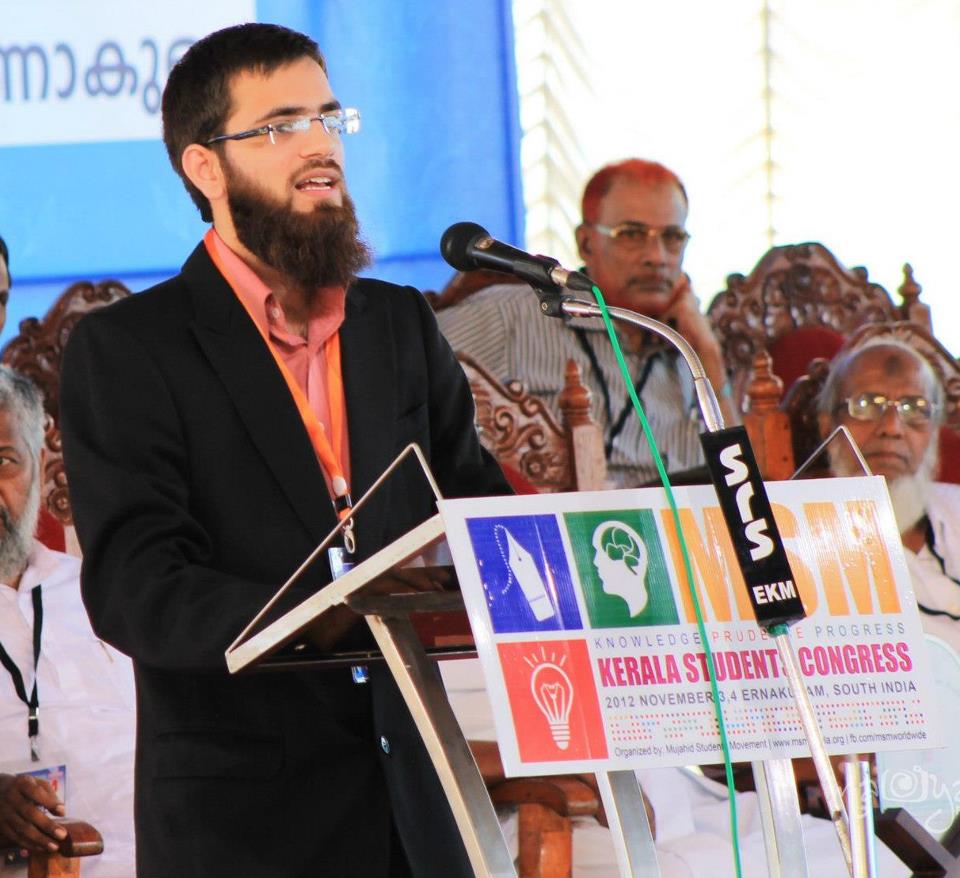Well known young Kashmiri Writer, Philanthropist, Activist, Researcher Mushtaq Ul Haq Ahmad Sikander is a dynamic personality of Kashmir and is associated with various state, national and international voluntary organizations.
In this exclusive interview with The News Kashmir Weekly Magazine , he talks with Rameez Makhdoomi, about his academic-activist pursuits, and the recent role he and his organization undertook in the post flood relief and rehabilitation efforts. Here are the excerpts
You worked untiringly especially in flood relief and rehabilitation, your take o nature of this tragedy?
It is an unfortunate fact that the state of Jammu & Kashmir and tragedies are synonymous. We are a witness to tragedies the day we are born in the state of J&K. Kashmir tragedy was one of severe natural or man made calamities (because there is a dispute about its nature) that has devastated the Valley of Kashmir, impacting more than 70% of the population directly or indirectly, destroying property, shelters, administrative departments and business worth billions. The three sectors agriculture, business and tourism that constitute the economic backbone of the state, all have been severely impacted by the floods. It will take many years to rebuild Kashmir.
In what conditions did Islamic Relief & Research Trust (IRRT) start its relief operations?
Islamic Relief & Research Trust (IRRT), is a registered trust and I as a member of core group take lead in decision making and coordinating our projects. The September 2014 floods impacted our trustees, executive council members and volunteers too. We were out of contact with each other for more than two weeks. Also our central office was out of bounds for weeks due to flood waters. In the last week of September we all the office bearers of IRRT met at my home and we chalked out our strategy for our post flood operations. At that time we never thought that we will be running such big relief and rehabilitation projects.
What type relief efforts were taken by IRRT and what types of challenges you faced?
IRRT initially alongwith Mercy Corps ran a month long medical camp at Allama Iqbal Mini Convocation Centre at Sanat Nagar, Srinagar. Some members of IRRT individually were also active in rescue efforts of those stranded in flood waters. Then we conducted a few medical camps in Srinagar and Baramullah. In post flood situation our big problem was identification of real victims of flood whose shelters and economy were destroyed during floods. The emphasis was on identification of vulnerable and poor sections of society that included widows and orphans. Thus we started first phase of our relief and rehabilitation operation with the exception of medical camps in the first week of October. We distributed food kits among three thousand families of Srinagar, Pulwama and Baramullah districts. We stopped at three thousand because we don’t have many resources to cater to more flood victim families. Then we distributed blankets and winter kit that includes bedding, warm clothes, water bottle, chargeable lights etc among one thousand of these families. IRRT is the first organization that provided rents under home rental project to scores of families whose houses were destroyed in the floods. We are also constructing dozens of two room houses including a washroom for widows in Baramulla. We also provided stationary and books to hundreds of children under our educational project who have lost their reading and writing material.
We also tried to form a coordination of various organizations of voluntary sector that would give an organized shape to the relief efforts, but we failed to forge unity among the voluntary sector.
How do you witness the role played by state during floods and post flood situation?
If the state would have played its role, it would certainly have lessened the burden from our shoulders. The state and huge administrative manpower and institutions simply withered away during the floods. The people were on the forefront of most of the rescue and relief efforts. It also depicted the strength of the Kashmiris as a nation who got united in the face of an adversity. In the post flood situation the State could only help people in filing First Information Reports (FIR)s at police stations, provide free ration for few months and allocate uneven and skewed compensation cheques to families whose houses were completely damaged during the floods. The people are very angry at the State and due to its incumbency it has further alienated the Kashmiri masses.
But for the permanent rehabilitation the efforts of State are necessary and all civil society members and voluntary sector are ready to cooperate with them, but State is attending to other issues more judiciously and has thrown the issue of rehabilitation of flood victim families on back burner. This dismal attitude of State towards flood victims can have a negative impact on the already fragile relation of State with its people.
As a youth social and peace activist, do you think youth find activism attractive?
Kashmiri youth always have been activist, mostly on political level. Yes I certainly think that youth are attracted to activism as most of our team of volunteers comprise of youth, who invest their time, money and efforts for our projects.
Even if youth work voluntarily, with dedication and selflessly mostly they are exploited and provided little space in decision making process of any organization. Have you experienced the same as an activist?
The concerns raised are quite genuine and most of the youth are provided little space in decision making. But youth should be cautious while investing their time and money selflessly with a certain organization, only then they can safeguard themselves against exploitation.
IRRT is founded by A.R Hanjura, who is the father of social activism in Kashmir and has decades of experience in voluntary sector and its Director is the well known academic, scholar and activist Prof. Hamid Naseem Rafiabadi. I am fortunate enough to learn under the guardianship of these two stalwarts and they have given me a free hand to coordinate and initiate our various projects. The space provided to be is ample hence I never felt suffocated or exploited.
Being actively engaged with writing and research, attending various conferences in India and abroad, how do you find time for activism?
Nice query. One does not find time and there is no right time. One has to adjust his priorities rightly. My activism is influenced by my research and writing. My activism is a natural outcome of my reading and research and I believe that writing alone doesn’t work unless corroborated by activism. But I must mention the role of my family, particularly my parents who have always supported me in my endeavors of research, writing and activism. If it was not family support I would have been incapable of accomplishing multiple and simultaneous tasks.
Based on your experiences are NGOs in Kashmir committed or money minting machines?
In Kashmir we have not yet developed NGO culture. We have voluntary sector that works on traditional lines. There is little professionalism in our voluntary sector. What I have witnessed that professionals who are working in NGOs lack empathy that is needed in voluntary sector. I am not a professional social worker, but I have learned much through my activism and dealing with people. We need people who are financially independent and don’t earn from social activism, because once money is involved with social activism, the work suffers in most cases.
In case of Kashmir, we have thousands of registered NGOs but on ground not more than a dozen are working whose work is having positive impact on vulnerable sections and who are working for the betterment of society. Most people have rendered NGOs as a business and then you have GSNGOs (Government Sponsored NGOs) who mint money and siphon funds in millions. It is for the people and civil society to make the NGOs accountable and responsible towards transparency. Those NGOs and Voluntary sector organizations that are working selflessly need to be strengthened by people. There are black sheeps in every sector, NGOs are no exception, but that does not render them irrelevant.
IRRT website can be accessed at www.irrtonline.org and M.H.A.Sikander can be contacted at sikandarmushtaq@gmail.com



